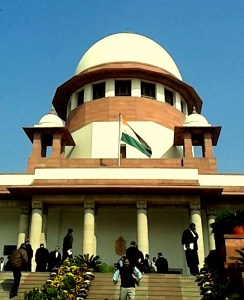Video conferencing cannot be directed in transfer petition” holds SC by 2:1, overrules Krishna Veni Nagam
A three judge bench of the Supreme Court of India, while hearing a reference made by a two-judge bench, has held that “in transfer petition, video conferencing cannot be directed”. The aforesaid view was taken by Chief Justice of India Dipak Mishra and Justice AK Khanwilkar. Justice DY Chandrachud favoured the use of modern technology and dissented.
Three judge bench overruled the earlier judgment of a two-judge bench in Krishna Veni Nagam v. Harish Nagam, which had led the practice of Supreme Court referring the parties to participate in the matrimonial dispute cases through video conferencing, when the parties approached the Court for transfer of their matters. The three judge bench has held that “the statement of law made in Krishna Veni Nagam if either of the parties gives consent, the case can be transferred, is absolutely unacceptable”. This judgment has however been overruled prospectively and shall not affect the judgments passed following the two judge bench judgment.
The three judge bench in Santhini v. Vijaya Venketesh – Transfer Petition (Civil) No. 1278 of 2016 and Santhini v. Vijaya Venketesh – Transfer Petition (Civil) No. 422 of 2017 has held:
i. In view of the scheme of the 1984 Act and in particular Section 11, the hearing of matrimonial disputes may have to be conducted in camera.
ii. After the settlement fails and when a joint application is filed or both the parties file their respective consent memorandum for hearing of the case through videoconferencing before the concerned Family Court, it may exercise the discretion to allow the said prayer.
iii. After the settlement fails, if the Family Court feels it appropriate having regard to the facts and circumstances of the case that videoconferencing will sub-serve the cause of justice, it may so direct.
iv. In a transfer petition, video conferencing cannot be directed.
v. Our directions shall apply prospectively.
vi. The decision in Krishna Veni Nagam (supra) is overruled to the aforesaid extent.
The three-judge bench was assisted by senior advocate Ajit Kumar Sinha.
A two-Judge Bench of the Supreme Court had in a transfer petition seeking transfer of a matrimonial dispute case under Section 13 of the Hindu Marriage Act, 1955 IInd Presiding Judge, Family Court, Jabalpur, Madhya Pradesh to the Family Court, Hyderabad, Andhra Pradesh, in Krishna Veni Nagam v. Harish Nagam, ordered:
- We, therefore, direct that in matrimonial or custody matters or in proceedings between parties to a marriage or arising out of disputes between parties to a marriage, wherever the defendants/respondents are located outside the jurisdiction of the court, the court where proceedings are instituted, may examine whether it is in the interest of justice to incorporate any safeguards for ensuring that summoning of defendant/respondent does not result in denial of justice. Order incorporating such safeguards may be sent along with the summons. The safeguards can be:-
i) Availability of video conferencing facility.
ii) Availability of legal aid service.
iii) Deposit of cost for travel, lodging and boarding in terms of Order XXV CPC.
iv) E-mail address/phone number, if any, at which litigant from out station may communicate.